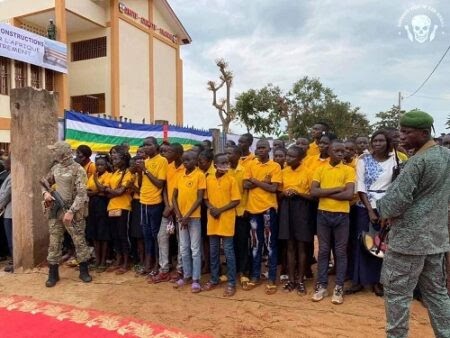UN Experts Urge Central African Republic To Cut Ties With Russian Paramilitary Groups
The experts presented an argument detailing various crimes committed by the Russian Wager group.

A group of United Nations experts on Wednesday, Oct. 27, called on the Central African Republic government to “put an end to its relations with Russian paramilitary groups, in particular the Wagner private security group, accused of harassing and violently intimidating civilians.”
“We are extremely preoccupied by the acts of intimidation and recent information concerning the violent harassment committed by the military personnel and private security operatives against individuals and the community,” the UN experts declared in a communique.
Central African Republic forces supported notably by hundreds of Russian paramilitary fighters of the Wagner group, according to the UN and France, have since the beginning of the year been carrying out a vast counter-offensive against rebel groups in the country.
Russia officially says it has 1,135 unarmed instructors in the Central African Republic.
The UN experts are said to have also received information according to which members of the Wagner Group committed rape and sexual violence against women, men and young girls in numerous regions of the country.
“Giving the exact number of these acts is quasi-impossible because survivors are terrified about the idea of seeking justice for fear of reprisals,” the UN experts said in the communique.
“We call on the government of the Central African Republic to put an end to all relations with military personnel and private security outfits, in particular the Wagner Group.”
In March this year, the UN had condemned the systematic and serious violations of human rights by the Wagner Group notably “arbitrary detentions, acts of torture, forced disappearances and summary executions.”
The UN noted that the actions continue to date with impunity.
At the beginning of this month, the authorities in Bangui confessed to part of the accusations made by the UN notably concerning “crimes and acts of torture committed mostly by rebels but also soldiers of the Central African Republic and their Russian instructor allies.”
Classified as the second least developed country in the world by the UN, the Central African Republic has since 2013 been plunged into a bloody civil war with complete regions out of the control of the central government.
On Oct. 15, President Faustin Archange Touadera declared a unilateral ceasefire by its army and its allies against rebel groups.
Support Our Journalism
There are millions of ordinary people affected by conflict in Africa whose stories are missing in the mainstream media. HumAngle is determined to tell those challenging and under-reported stories, hoping that the people impacted by these conflicts will find the safety and security they deserve.
To ensure that we continue to provide public service coverage, we have a small favour to ask you. We want you to be part of our journalistic endeavour by contributing a token to us.
Your donation will further promote a robust, free, and independent media.
Donate HereStay Closer To The Stories That Matter




